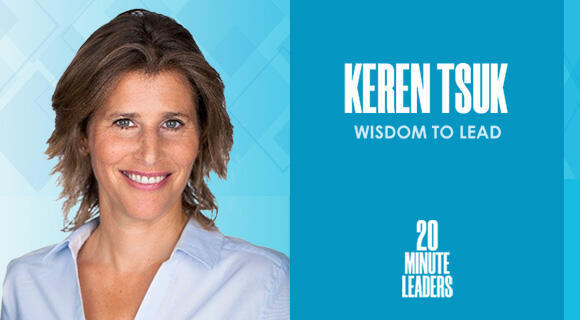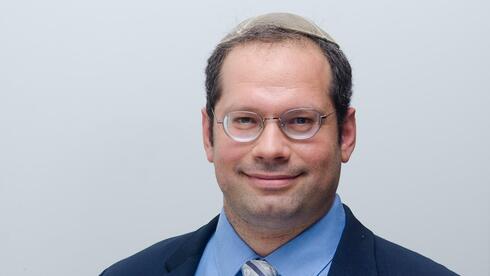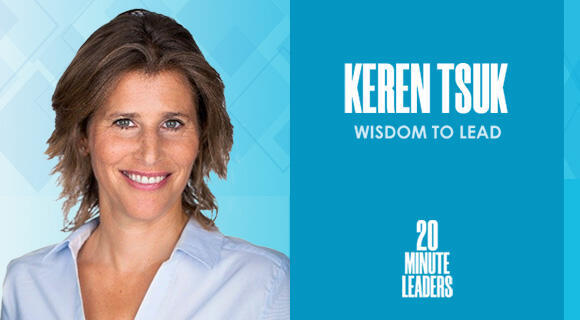
20-Minute Leaders
“I see new leadership as a social process.”
Pausing to reflect and be mindful is critical for leaders today, says Keren Tsuk, CEO and founder of Wisdom to Lead
Pausing to reflect and be mindful is critical for leaders today, says Keren Tsuk, CEO and founder of Wisdom to Lead. With a PhD in leadership and years of case study experience, she has seen the benefits for individuals and companies when leaders take time to be more aware. She suggests beginning each day with a few minutes of meditation, but mindfulness also extends to being willing to really listen to the needs around you, asking hard questions, and being present with others. Tsuk shares examples of executives who created space for dialogue around hard issues and included employees in the process, which led to better results. She explains that people want to feel connected and seen at work, so being there for those on your team is important. Tsuk also sees leadership as a more social process now that involves everyone in a company, not just executives and managers.
Keren, how does one get to become an expert in leadership?
First of all, it's leading by example. It starts with evolving as a person. You learn from experience. I conducted a case study for two years in a high-tech company because I was really interested to learn what's happening when theory meets the field.
My leading question is: what is the role of leaders nowadays in leading financially successful organizations, alongside motivating and engaging the employees and enabling them to fulfill themselves and to be creative? I found that mindfulness is a crucial element that leaders will need to embrace in order to engage people, to reinvent ourselves, to evolve.
I'm working with these tools and this experience to help people to listen deeper to themselves, their employees, the customers, and the market, and to listen to what they really need. And then to create products and services that add value to the community.
Why is leadership something that we find difficult to really do really well?
First of all, we need to be able to really listen to what's needed and not act out of our ego and automated behaviors. We need to dare to pause and ask ourselves tough questions. We don't like to look in the mirror and say, "I was wrong.” We really need to connect to our humanity and to others, and at the same time, to see the bigger picture and not to be hooked up in our story.
A mindful leader has the ability to be mindful and present. Also to hold tensions: between the short-term and the long-term, between the employees’ needs and the organization needs, between speed and quality. As a leader, I need to be able to hold these tensions and really listen.
From what I'm understanding, it really stems from this ability to pause, reflect, and realize there is a new situation here, being more mindful of the situation and being able to pause more. Correct?
Yes. In my research and my book, I'm talking about tools for leaders, and I call it a dialogue space. It's the ability to create a space to explore together and to come humble, be present, and share my experience. But I don't need to have the answer. It's okay to say, "I don't know what's the right way.” Now listen to the other people and create space to really explore. We can create a place for new solutions to emerge, much more creative and innovative.
When we're talking about a leader, is it mainly the leader of the organization? Or are there more people that would benefit from these concepts?
It's for each and every one of us. The workplace is changing and leadership is changing. Every one of us needs to create relationships based on trust and partnership with our colleagues, employees, vendors: everybody. They want to see meaning, and they will engage. The new leadership, I see it as a social process. It's not a one leader that leads the company. There are a lot of leaders there.
What are some things that I can do when our conversation is over to become a better leader myself?
I recommend starting the day by taking five or 10 minutes to meditate. If you don't like to meditate, go to nature for 10 minutes. Start the day by cleaning your mind. You can use it during the day for five minutes between meetings. You will be much more efficient, effective, and productive.
Another thing to do as a leader for employees: be present with them. It's really critical nowadays to be there for the employees. If you see an employee struggling, refer to him emotionally and ask him how you can help him. Don't come with the solution. If a colleague feels seen, it's enough.
If we're looking at CEOs and executive teams, how is this something that is relevant for the success or the demise of the company?
Let's talk about leaders’ ability to be vulnerable and authentic, not showing a rosy picture that is not really what's happening. In the company where I conducted my PhD, they were struggling. They stopped recruiting. People started talking, and anxiety increased. When we don't know what's happening, we feel anxiety and stress. The CEO told me, "I'm going to have a company meeting. I am going to share the situation."
He told them, "This is the situation right now. I can't guarantee what will be in six months. But once I know, I will let you know." But the fact that he showed up and was vulnerable and authentic with them, it was amazing. People stopped talking behind closed doors because they felt part of the process. People were really relaxed once he talked with them, even though he didn't give the answers that they wanted.
Another example I can give you is from a manager that went through my course. Beyond Corona, she also went through a tough divorce. She didn't share with her team what she went through. During the course, we talked about vulnerability. After the call, she decided to share with the team what she went through. She told me, "It was amazing. People connected with empathy towards me." She told me people started showing up. It created trust and a deeper connection between the team. From this place, you can do anything.
As the CEO from the first example, especially in today's market and the competition for talent, it must be a really scary thing to say, "We're not necessarily doing as well as your friend who is mainly sharing how good their company is doing." How do I know whether this is the right solution? Or is it your opinion that it's always the right solution?
I think every situation is different. You need to really be mindful and present with the situation. But at the end of the day, our company is built on people. People are talking and people are feeling the culture. If they feel seen and their CEO showed up and dared to be vulnerable with them, they feel they want to be part of this company.
It's like a stone that you throw in the river and it creates ripples. The nice images, the logos, the benefits, the perks: it's not enough anymore. People are looking for meaning in the workplace, to be seen, to feel connected, to have impact, and to be a partner of their company.
Another example: I worked with another VP of a big company that was going through transformation. His people’s terms and conditions would be affected negatively from the change. He said, "What do you think? Usually, I don't tell them what's happening.” He was afraid that people would leave him. I told him, "How would people react at the end of the change when they didn't know anything and they weren't part of the process?" I offered for him to create the dialogue spaces and to share with his employees and managers the situation and to listen to them.
After the first time he did it, he came back and said it wasn’t good. I said, "Why not good?" He said, "Only a few had creative ideas, but most of them said really tough things." I told him, "It sounds like it wasn't easy, but it was really meaningful because you were present with them in this unpleasant feeling." After our meeting, he understood that this is the right way forward. He continued with it, listening to the employees, although it wasn't easy for him. At the end of the process when they did need to decrease the terms, most of the people stayed with him.
Michael Matias, Forbes 30 Under 30, is the author of Age is Only an Int: Lessons I Learned as a Young Entrepreneur. He studies Artificial Intelligence at Stanford University, is a Venture Partner at J-Ventures and was an engineer at Hippo Insurance. Matias previously served as an officer in the 8200 unit. 20MinuteLeaders is a tech entrepreneurship interview series featuring one-on-one interviews with fascinating founders, innovators and thought leaders sharing their journeys and experiences.
Contributing editors: Michael Matias, Megan Ryan














